#SGE Google
Explore tagged Tumblr posts
Text
Google Search Generative Experience Is User Experience in 2025

In 2025, we are experiencing a rapidly evolving digital world, with one of the biggest changes, so far, being the introduction of SGE or Search Generative Experience. AI is changing search behavior with the integration of advanced systems; Google artificial intelligence-powered search is changing how users use search engines with new forms of interactions, and it has a significant impact on how businesses will need to begin to think about SEO. If you focus on digital marketing, content creation, or web optimization, it’s time to know how SGE Google is changing the SEO impact.
Under stand SGE
Google SGE or Search Generative Experience is a significant update and uses generative AI to provide a more interactive, customized search result for users. Google AI search will now give users conversational summaries, visual responses and real time answers to queries, instead of simply providing listings of websites links. Therefore, users could gain a better understanding of something without having to click through various links.
This Google search update in 2025 has user experience strategies designed to decrease time spent searching and increase relevant results. For example, if a user were to ask a multi-part question, SGE could break down the entire question, and respond with AI-generated summaries from very high authoritative sources.
How SGE Affects SEO
With Google SGE, traditional ranking methods are changing. Here's how it impacts SEO:
Visibility Shift: Websites may no longer get traffic the same way as before. AI-generated summaries often answer the question directly, leading to more zero-click searches.
Content Quality Matters More: Google’s AI favors high-quality, informative, and trustworthy content. E-E-A-T (Experience, Expertise, Authoritativeness, and Trustworthiness) plays a vital role in what gets shown.
Long-tail Keywords Gain Value: Conversational AI performs best with detailed queries. So optimizing for long-tail, natural-language keywords is more effective than ever.
Structured Data and Semantic SEO: Google needs to understand your content clearly. Using structured data, schema markup, and topic clusters will help the AI select your content for featured snapshots.
Improving User Experience with AI-Powered Search
For users, Google AI search provides an experience that is faster, smoother, and smarter than anything currently available. Users are able to converse with search results, have conversational follow-up questions, and receive more refined answers almost instantaneously. It is a personalized experience that is similar to a chatbot or virtual assistant, but Google is using all the power of its search index to facilitate this user experience. For brands, this means there is a user intent to consider and not just keywords. Answer common questions as clearly and concisely as possible, and format your content to serve users who are at varying stages of their buyer journey. Videos, FAQs, and how-to guides still provide an essential part to the engagement process for users.
What Marketers Should Do Now
To stay ahead of the curve, digital marketers and SEO professionals must:
Focus on content depth and authority
Use tools like Seobix to analyze keyword intent and ranking changes
Monitor Google search update 2025 announcements closely
Embrace AI tools to generate ideas but always edit for accuracy and originality
Conclusion
The rollout of Google SGE represents a shift in search and SEO. The era of AI-driven search has shifted attention away from keyword stuffing and back to user-first content, which gives power back to the users - and they are looking for authentic connections, insights, and solutions they can use in their lives, jobs, and experiences. Businesses need to take action quickly to maintain visibility and traffic. If you follow the developments, and begin to optimize your content for Search Generative Experience - you'll be in a better position to thrive as the digital landscape continues to evolve in 2025.
#Google SGE#Search Generative Experience#Google AI search#AI-powered search#Google search update 2025#SGE Google
1 note
·
View note
Text
Why SEO Needs a GEO Update in 2025

In 2025, search behavior has evolved—people are getting answers directly from AI tools like Google SGE and ChatGPT without even clicking search results.
This blog explains: 🧠 What GEO (Generative Engine Optimization) really is 📊 How it's changing search visibility forever 📌 The tools and content formats that AI prefers 📈 Real case studies from Reddit, Seer Interactive, and more
💡 Don’t just rank—get featured in answers.
🚀 Read here: Click here
#seo#ai seo#generative ai#geo#google sge#marketing2025#digitalmarketing#searchtrends#openai#futureofseo#contentmarketing
0 notes
Text
Smarter Search: How AI Is Rewriting the Rules
Search engines are no longer just about ranking pages—they’re becoming intelligent companions that understand, reason, and respond in real time. Thanks to AI, the way we search is evolving from typing keywords to having conversations.
🤖 AI is reshaping search from static results to dynamic, context-aware answers.
🔍 𝐇𝐞𝐫𝐞’𝐬 𝐡𝐨𝐰 𝐀𝐈 𝐢𝐬 𝐭𝐫𝐚𝐧𝐬𝐟𝐨𝐫𝐦𝐢𝐧𝐠 𝐒𝐞𝐚𝐫𝐜𝐡:
✅ 𝐂𝐨𝐧𝐯𝐞𝐫𝐬𝐚𝐭𝐢𝐨𝐧𝐚𝐥 𝐐𝐮𝐞𝐫𝐢𝐞𝐬 𝐚𝐧𝐝 𝐍𝐚𝐭𝐮𝐫𝐚𝐥 𝐋𝐚𝐧𝐠𝐮𝐚𝐠𝐞 Instead of “best laptops 2025,” users now ask, “What’s a good laptop for video editing under $1,000?” AI understands intent—not just keywords.
✅ 𝐀𝐧𝐬𝐰𝐞𝐫𝐬, 𝐧𝐨𝐭 𝐥𝐢𝐧𝐤𝐬 AI-powered engines like Perplexity, Google SGE, and Bing AI generate direct answers, summaries, and overviews—reducing the need to click around endlessly.
✅ 𝐂𝐨𝐧𝐭𝐞𝐱𝐭𝐮𝐚𝐥 & 𝐏𝐞𝐫𝐬𝐨𝐧𝐚𝐥𝐢𝐳𝐞𝐝 𝐑𝐞𝐬𝐮𝐥𝐭𝐬 Search adapts to you—your preferences, history, and intent—to surface what’s most relevant to you, not just what’s popular.
✅ 𝐒𝐞𝐦𝐚𝐧𝐭𝐢𝐜 𝐔𝐧𝐝𝐞𝐫𝐬𝐭𝐚𝐧𝐝𝐢𝐧𝐠 & 𝐑𝐚𝐠-𝐏𝐨𝐰𝐞𝐫𝐞𝐝 𝐀𝐧𝐬𝐰𝐞𝐫𝐢𝐧𝐠 AI leverages vast knowledge sources, connects context, and retrieves verified content across multiple domains in milliseconds.
✅ 𝐕𝐨𝐢𝐜𝐞 𝐚𝐧𝐝 𝐕𝐢𝐬𝐮𝐚𝐥 𝐒𝐞𝐚𝐫𝐜𝐡 Multimodal search—where you can speak or upload an image—makes searching faster, more intuitive, and less text-bound.
📌 𝐓𝐡𝐞 𝐁𝐢𝐠 𝐏𝐢𝐜𝐭𝐮𝐫𝐞: Search is shifting from being a tool to a thinking partner. With AI at its core, the future of search is faster, deeper, and more human than ever. 🔗 Read More: https://technologyaiinsights.com/
📣 About AI Technology Insights (AITin): AI Technology Insights (AITin) is the fastest-growing global community of thought leaders, influencers, and researchers specializing in AI, Big Data, Analytics, Robotics, Cloud Computing, and related technologies. Through its platform, AITin offers valuable insights from industry executives and pioneers who share their journeys, expertise, success stories, and strategies for building profitable, forward-thinking businesses. 📍 𝐀𝐝𝐝𝐫𝐞𝐬𝐬: 1846 E Innovation Park DR, Ste 100, Oro Valley, AZ 85755 📧 𝐄𝐦𝐚𝐢𝐥: [email protected] 📲 𝐂𝐚𝐥𝐥: +1 (520) 350-7212
0 notes
Text
Zero-Click Search & SGE: Is Traditional SEO Dying in 2025?
The search landscape is undergoing a seismic shift in 2025. With the rise of Google’s Search Generative Experience (SGE) and zero-click results, the SEO playbook we’ve used for over a decade is being rewritten — in real time. Zero-Click Search & SGE: Is Traditional SEO Dying in 2025? What is Zero-Click Search? A zero-click search occurs when a user’s query is answered directly on the search…
0 notes
Text
Google SGE SEO: 5 Critical Changes That Could Wreck Your Rankings in 2025

Google SGE SEO is officially rolling out—and if you haven’t adjusted your strategy yet, you’re risking major visibility losses.
This is more than another core update. It’s an AI-driven shift that could slash your organic search traffic, bury your top-ranking pages, and force every marketer and business owner to rethink their content strategy from the ground up.
What Is Google SGE SEO?
Google SGE SEO is an AI-powered upgrade to traditional search. Instead of a list of ten blue links, users now see AI-generated summaries that answer their queries right at the top of the page. These summaries pull content from across the web and cite sources—sometimes.
That means:
Users get their answers without clicking your link.
Organic listings get pushed down (especially for informational queries).
Clicks go to Google’s AI, not your website.
Welcome to the world of zero-click searches on steroids.
Learn more directly from Google about SGE
Who Will Suffer Most?
Local service providers relying on SEO
Affiliate and review websites
Businesses with thin, generic, or outdated content
Bloggers and thought leaders not building authority
And that includes small businesses in cities like Cincinnati, Covington, or Dayton who have relied on tried-and-true local SEO strategies for years. It’s time to evolve.
How to Win in the Google SGE SEO Era
1. Level Up Your EEAT
Google favors brands with Expertise, Experience, Authoritativeness, and Trustworthiness. If you’re not showcasing your credentials and unique insights, you won’t get cited.
Tips:
Add author bios to blog posts.
Link to external research and citations.
Use case studies and testimonials to prove experience.
Pro Tip: If you need help assessing your site’s EEAT score, check out our SEO consulting services.
2. Create SGE-Optimized Content Structures
SGE pulls structured, scannable, and authoritative content. That means:
Clear headers (H2, H3)
Short paragraphs
Direct answers (like you’re replying to a question)
Bullet lists and tables
FAQ sections with schema markup
3. Write for People AND AI
It’s not just about keywords anymore. You need to anticipate conversational queries, because SGE functions like a blend of Google and ChatGPT.
Examples:
“What’s the best website design agency in Cincinnati?”
“How do I improve Core Web Vitals in 2025?”
Incorporate long-tail keywords and question-style headers that mirror natural language queries.
4. Prioritize High-Quality, Unique Insights
SGE wants to reference the best, not the most. If your content isn’t original, data-backed, or narratively rich, it won’t be included.
Ideas that work:
Proprietary surveys or reports
Local data or niche breakdowns
Strong opinions backed by expertise
5. Use Branded Search to Your Advantage
SGE leans into known brands. That means your brand presence across the web matters more than ever.
Checklist:
Keep your Google Business Profile updated.
Be active on LinkedIn, YouTube, and niche platforms.
Get mentioned or linked by local news outlets and industry publications.
Moz’s EEAT breakdown is worth a read
6. Stop Thinking in Clicks—Start Thinking in Visibility
Yes, SGE may reduce your click-through rates—but it can still build brand awareness, especially if your brand is cited directly in summaries. Focus on:
SERP impressions
Brand name mentions
Inclusion in AI summaries
This is the time to become a recognizable source.
7. Update Your Old Content—Now
Audit your top-performing content from the past 2–3 years. If it’s outdated, too shallow, or buried in fluff, it’s time for a rewrite. Aim for:
Updated facts, dates, and stats
Keyword refresh to reflect conversational search
Enhanced formatting for readability and clarity
Need help with this? Reversed Out offers content refresh and audit packages.
SGE Isn’t the End of SEO—It’s a Rebirth
This isn’t the death of organic marketing. It’s just a shift—from gaming the algorithm to earning your seat at the table. You don’t need more content—you need better content.
And if you’re not sure where to begin?
Let’s talk. We’ll audit your current content, flag what won’t survive SGE, and build a real strategy around what will.
Contact Reversed Out for an SGE-Ready SEO Strategy
How to Stay Ahead of Google SGE SEO in 2025
Google’s SGE isn’t just another update—it’s a complete shift in how search results are displayed and how users interact with them. To survive (and thrive), you need to move beyond traditional keyword stuffing and focus on building content that’s authoritative, structured, and trustworthy.
Here’s the bottom line:
If your brand isn’t being cited in AI-generated summaries, you’re invisible. Optimize for EEAT, use clean formatting, and double down on building recognizable authority across the web. The brands that adapt early will dominate search in 2025 and beyond.
Google SGE SEO FAQ's
What is Google SGE and how does it impact SEO? Google’s Search Generative Experience (SGE) uses AI to generate answers directly on the search results page, reducing click-through rates to traditional websites. It favors well-structured, authoritative content that directly answers user questions.
Will Google SGE hurt my website traffic? Yes, if you don’t adapt. SGE reduces organic clicks for many top-ranking pages. To maintain traffic, your content must be cited in AI summaries by improving EEAT and optimizing for structured search.
How can I optimize my content for Google SGE SEO? Use clear headers, FAQ sections, concise answers, internal links, and structured data. Focus on quality over quantity, highlight expertise, and refresh outdated content regularly.
What types of businesses are most affected by Google SGE? Local service providers, affiliate sites, and any business relying heavily on informational blog content for traffic are most vulnerable. Businesses in competitive industries like marketing, legal, and real estate are especially affected.
How can Reversed Out help with Google SGE SEO? We offer tailored SEO audits, EEAT-focused content strategies, and full content optimization to ensure your brand stays visible in the AI-powered search era. Get in touch with us to future-proof your SEO strategy.
Contact Us
At Reversed Out Creative, we understand the challenges and opportunities presented by AI disruption. Our team of experts specializes in web design, SEO, graphic design, and digital marketing services. Reach out to us through our contact form to learn more about navigating the evolving job market and embracing the potential of AI. Together, let’s shape a future that combines human ingenuity with the power of AI.
Content source: https://reversedout.com/google-sge-seo-cincinnati/
#Google SGE SEO#Search Generative Experience 2025#SEO ranking changes 2025#Google AI SEO updates#SEO strategies for Google SGE
0 notes
Text
How Generative AI is Changing the Face of Search Engines in 2025

In 2025, the search landscape is undergoing a radical transformation. Generative AI in search is no longer a buzzword—it's the backbone of next-gen AI search engine trends. From conversational queries to AI-generated summaries, search engines now function more like intelligent assistants than static libraries. As these innovations evolve, the future of SEO 2025 is being redefined right before our eyes.
We explores how generative AI is reshaping the search experience, what it means for SEO professionals, and how brands can adapt to maintain visibility in this AI-dominated ecosystem.
The Rise of Generative AI in Search Engines
Search engines like Google, Bing, and emerging players are embedding generative AI models like GPT-4, Gemini, and Claude into their core search functionalities. Instead of listing links, these engines generate rich, context-aware answers directly in the results. Google’s Search Generative Experience (SGE) is a prime example—users receive AI-generated overviews and even follow-up prompts, minimizing the need to click through multiple websites.
These updates align with major AI search engine trends in 2025:
• Conversational search replacing keyword queries. • AI-generated snippets as the new SERP real estate. • Enhanced visual + voice search integrations. • Personalization through user behavior prediction.
How This Impacts the Future of SEO in 2025
As generative AI in search continues to mature, SEO strategies are pivoting. The future of SEO in 2025 is now less about traditional keyword stuffing and more about semantic optimization, content relevance, and user intent alignment.
Key SEO Shifts:
• E-E-A-T (Experience, Expertise, Authoritativeness, Trustworthiness) is more critical than ever. • Long-form content is being replaced by modular, query-driven sections. • AI is prioritizing contextual value over backlink quantity. • Featured snippets are evolving into AI-Generated Overviews (AGOs).
To rank, content must be well-structured, high-authority, and built for AI parsing.
Google SGE, Bing Copilot & The New SERP Landscape
Google’s Search Generative Experience (SGE) and Microsoft’s Bing Copilot are redefining SERPs in 2025.
What’s Changed?
• Position Zero is now an AI-generated block with contextual, cited answers. • Less emphasis on 10 blue links, more on dynamic summaries and visual elements. • Users get follow-up questions and can explore a topic via interactive AI prompts.
For businesses, this means visibility in search requires being a cited source in AI-generated responses—not just ranking on page one.
Generative AI Tools Powering Search in 2025
These leading generative models are fueling today’s AI search engine trends:
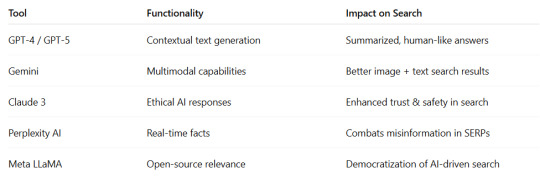
These tools learn user preferences, offering personalized and predictive search experiences.
AI Search Engine Trends 2025: What to Expect Next?
Here are the top AI search engine trends you must watch in 2025:
Search Personalization 2.0: Search engines understand your tone, context, and history.
AI-first SERPs: Native AI summaries will dominate above-the-fold results.
Brand Mentions over Links: Engines cite authoritative brands even without backlinks.
Visual-Text Fusion: Search with images, voice, and text in a seamless flow.
SEO for Chatbots: Optimizing for AI tools like ChatGPT, Perplexity, and Google Bard.
How Brands & SEOs Can Adapt in 2025
If you're in digital marketing, adapting to generative AI in search is mission-critical.
Actionable Steps:
• Focus on topical authority, not just keywords. • Use structured data to help AI understand your content. • Publish first-hand expertise content—case studies, opinions, interviews. • Embrace AI-enhanced writing tools for better scalability. • Optimize for AI-powered platforms (e.g., Perplexity, You.com, Bing Copilot).
Remember, the future of SEO 2025 is about creating content that humans trust and AI understands.
Final Thoughts: Embrace the AI Shift or Get Left Behind
Search is no longer about just typing in a box—it’s about having a conversation with AI. From Google’s SGE to Bing’s Copilot, generative AI in search is transforming how users find and interact with information.
For marketers and brands, staying visible means adapting now. Embrace the AI search engine trends, align with the future of SEO 2025, and invest in meaningful, human-centric content that speaks the language of both people and machines.
#tagbin#writers on tumblr#artificial intelligence#tagbin ai solutions#technology#ai trends 2025#AI search engine trends#generative AI in search#future of SEO 2025#Google SGE#Bing Copilot#AI-powered search#conversational search 2025#AI content ranking#voice search trends 2025
0 notes
Text
Google SGE is reshaping SEO in 2025. Site It Now helps your brand stay visible with AI-optimized content, expert strategies, and complete SEO services.
#Google SGE#Google Search Generative Experience#Search Generative Experience#SEO Agency#SEO Company#SEO Services#Search Engine Optimization#Google AI search#Future of SEO#SEO updates 2025#Site It Now
0 notes
Text
Arab Newswire on The Role of Press Release Distribution in AI Search Engines
DUBAI, UAE – (ARAB NEWSWIRE) — In the digital age, the intersection of artificial intelligence (AI) and public relations (PR) has transformed the way information is disseminated, discovered, and consumed. Press release distribution, a time-honored method of broadcasting corporate news and announcements, has found renewed relevance in an era dominated by AI-driven search engines. As AI technology…
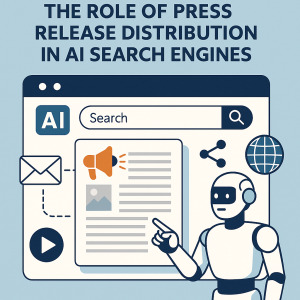
View On WordPress
#AI#AI Search Engines#Arab Newswire#Google SGE#Machine Learning#natural language processing#press release distribution#Search Engines#Search Generative Experience
0 notes
Text
Understanding Google SGE: A Shift in Search Experience

The Google SGE (Search Generative Experience) is an AI component provided by Google that changes the way we as users now engage with SERPs (Search Engine Results Pages). With the advent and expansion of generative AI, Google is making this option available so users can explore search in a way that makes the information more interactive, conversational and informative than ever before. In many respects, this is profoundly changing the method at which we forager information and ultimately allows the user the option to highlight a lot context rich information that AI generates, right at the top of the SERPs. Google SGE is similar to standard search snippets in that they both represent an overview of the user's query, but SGE uses large language models (LLMs) or a fast, AI-based overview of the user's request. More specifically, Google SGE aggregates and organizes the case-related information from credible sources and presents it as a summary to the user. Consequently, the user not only saves time, but the overall search experience is enhanced by providing not only concrete information but providing concrete answers, instead of compelling the user to click through multiple links.
How Google SGE Works
When users enter in a search term, Google SGE instantly curates a snapshot — a block of AI-generated text — appearing above the normal search results. This AI Overview replicates insights, facts, and sometimes even questions to ask afterwards. Users can expand the section to dive deeper into links to the websites where the AI sourced its information.
For example, if you search “best digital marketing strategies in 2025”, instead of just a list of websites, SGE would return an AI generated summary of what top strategies are trending, pulling from reputable sources. The enhancements in relevance and efficiency are a big step forward for Google SERP features.
Why Google SGE Matters for SEO
The SGE Google update is changing the SEO game in a now very meaningful way. With the presence of AI-generated content occupying the SERPs and taking the top positions, traditional organic listings are pushed down further in the results. This could lead to drops in clicks for sites that are hyper dependent on top organic positions.
As a result, the SEO professional community needs to adopt content optimization for AI Overviews, generative searches, whatever it is called. Content must be clear and concise, with headings and content clear and simple. The AI recognizes content that is authoritative, simple, and answers the users query. They'll likely embrace content that matches those three criteria, along with focusing on intent, which includes the keyword intent.
Moreover, websites that demonstrate strong E-E-A-T (Experience, Expertise, Authoritativeness, and Trustworthiness) are more likely to be cited by Google's generative AI. Therefore, enhancing content quality and building backlinks from trusted sources are key strategies to maintain visibility.
Future of Search with AI Integration
Google SGE is in Search Labs and rolling out slowly to more users, representing Google's long-term vision for a more conversational, intelligent search experience. This update is not only important for users as it simplifies complex search behavior, but it also challenges both marketers and businesses to re-imagine their approach to SEO.
In the future expect SGE to become even more personalized, using user behavior and preferences to deliver customized results. Expect voice search, mobile-first indexing, and real-time content to play an even larger role in the evolution of Google AI in search.
Conclusion
Google SGE is not simply a feature, it's a change in how search engines provide value. By using AI in a way that can deliver instant value for its users, it changes the expectations of what will come with the search experience. For content creators and SEO professionals, the expectation to adjust content strategies to this Search Generative Experience is critical. To stay in front of the changes, try to create the highest quality and most helpful content that resolves user intent and adheres to Google's continually changing process.
1 note
·
View note
Text
Formation Google SGE SEO & IA – Maîtrisez le Référencement de Demain
2 Jours pour Adopter les Nouveaux Enjeux du SEO avec l’Intelligence Artificielle Dans un contexte où les moteurs de recherche évoluent rapidement grâce à l’IA, notamment avec l’émergence de Google SGE (Search Generative Experience), cette formation de 2 jours à Bruxelles vous offre les clés pour adapter votre stratégie de référencement et exploiter les technologies d’intelligence artificielle…
0 notes
Text
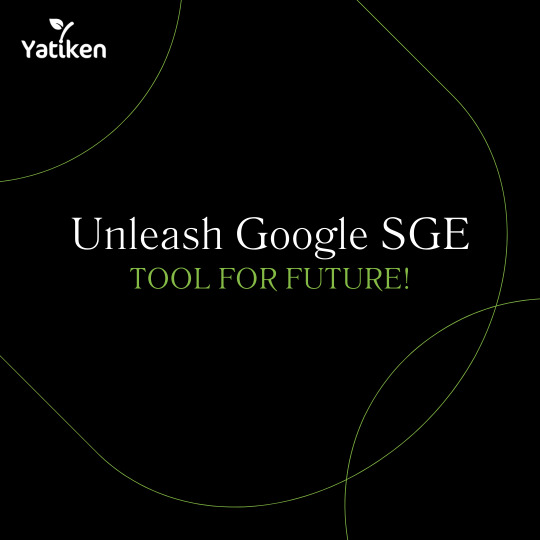
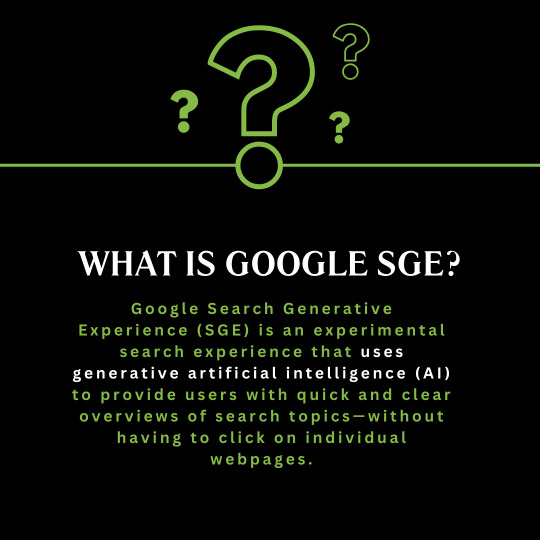
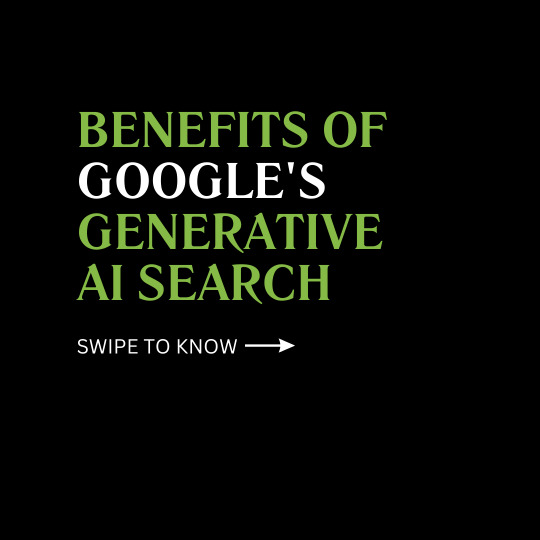
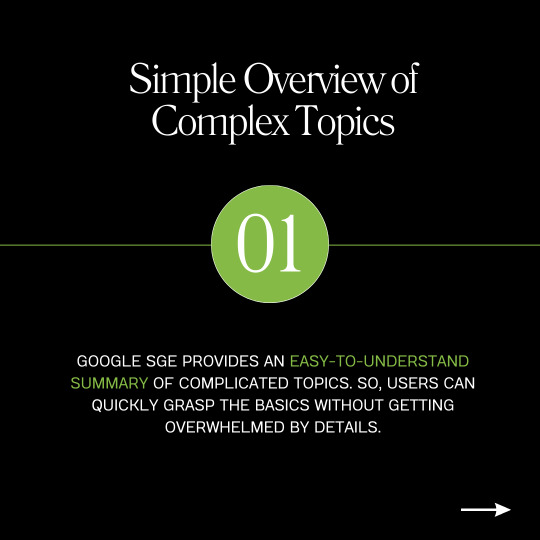
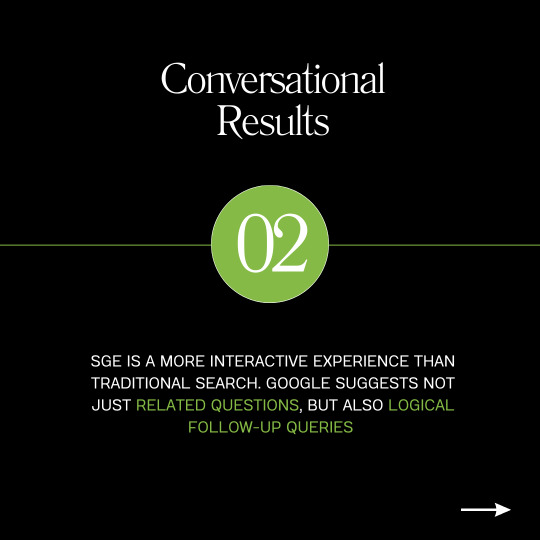
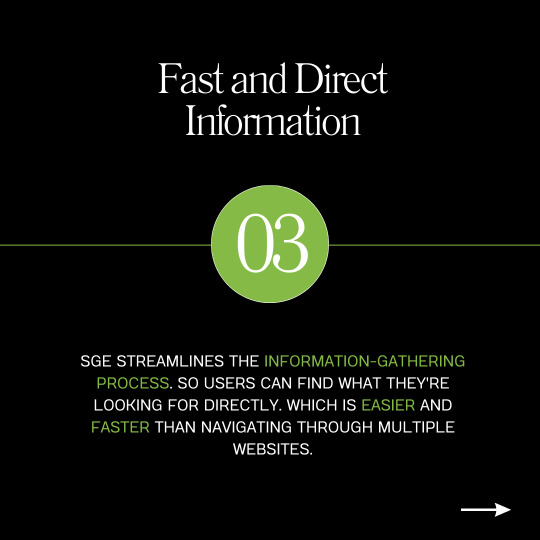
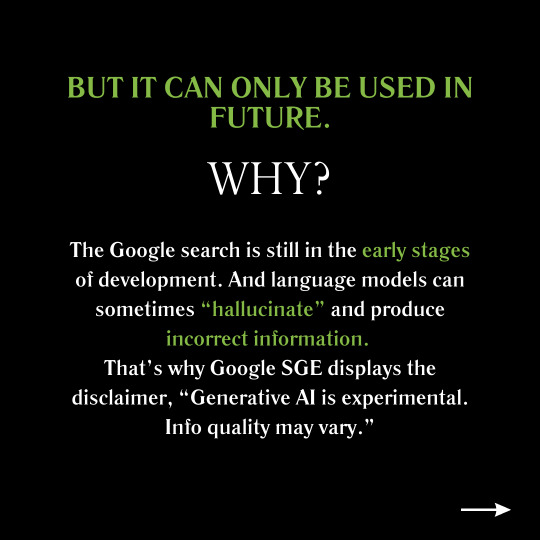

Dive into the future of search with Google SGE (Search Generative Experience)!
Google SGE aims to provide users with richer, more detailed answers to their queries. Instead of just a list of links, you get context-rich, comprehensive responses. SGE enhances your experience by making search more intuitive and informative.
However, keep in mind that Google SGE is still early stage of development. But with each update, we get closer to realizing its full potential.
How does this SGE update effect the SEO?
Look out for our upcoming posts to get the answer!
#google sge#search generative experience#digital marketing agency#best social media marketing agency
0 notes
Text
Sitemap Generator vs Google Sandbox: The SEO Battle You Can Win

So, you’ve poured your heart and soul into building a fantastic website for your startup. It’s visually appealing, packed with informative content, and perfectly optimized for mobile users. But there’s just one problem — crickets. Your website seems invisible in search generative experience, trapped in the dreaded Google Sandbox.
The Google Sandbox: Friend or Foe?
The Google Sandbox is a widely-believed phenomenon where new websites face an initial period of lower visibility in search results. While Google hasn’t officially confirmed its existence, many SEOs believe it’s a way for Google to assess the quality and legitimacy of new sites before boosting them in search rankings. The duration of the Sandbox is debatable, ranging from weeks to months.

Here’s where a sitemap generator becomes your secret weapon in the battle against the Google Sandbox:
Improved Discoverability: Sitemaps act like roadmaps for search engines, clearly outlining all your website’s pages and their structure. Submitting your sitemap to Google Search Console essentially tells Googlebot, the search engine’s web crawler, exactly where to find your valuable content. This can significantly improve the speed and efficiency with which Google indexes your website.
Prioritization Power: Sitemaps allow you to specify the importance of certain pages and how often they’re updated. This helps Google prioritize crawling and indexing of your most crucial content, potentially accelerating your website’s visibility in search results.
Fresh Content Communication: If you’re constantly adding fresh content to your startup’s website, an updated sitemap helps Google discover these new pages quickly. This keeps Google engaged with your website and encourages them to crawl and index more frequently.
Choosing the Right SGE for Your Startup
With a plethora of free and paid SGE options available, consider these factors when making your choice:
Ease of Use: Look for an SGE that’s user-friendly, even for those without extensive SEO knowledge.
Customization Features: Ideally, the SGE should allow you to specify update frequency and prioritize important pages relevant to your startup’s niche.
Scalability: As your startup grows, your website will too. Choose an SGE that can handle a growing number of pages.
Beyond Sitemaps: Additional Tips for Sandbox Escape
While an SGE is a powerful tool, it’s just one piece of the SEO puzzle. Here are some additional strategies to help your startup website emerge from the Google Sandbox:
High-Quality, Targeted Content: Create informative, engaging content that solves your target audience’s problems and establishes your startup as an authority in its niche.
Strategic Backlink Building: Earn backlinks from high-authority websites in your industry. This signals trust and credibility to Google.
Technical SEO Optimization: Ensure your website has a clean code structure, fast loading times, and is mobile-friendly.
Conclusion
The Google Sandbox might seem like a hurdle, but it’s not insurmountable. By strategically using a sitemap generator along with other SEO best practices, you can significantly improve your startup website’s chances of escaping the Sandbox and achieving top search rankings. Remember, SEO is a long-term game. Stay focused on creating valuable content, building backlinks, and providing an exceptional user experience. With dedication and the right tools, your startup website will soon be basking in the sunshine of search engine success.
0 notes
Text
1 note
·
View note
Text
How to Make Your Tech Blog Rank with Google's SGE (Search Generative Experience)
As Google’s Search Generative Experience (SGE) continues to evolve, it’s changing the way content is ranked, especially for tech blogs. Understanding how to optimize for this new AI-driven search feature is essential for staying ahead in the game. SGE introduces generative AI elements directly into search results, providing users with a more personalized and dynamic browsing experience. This…
0 notes
Text

So what I’m getting is
The Texting Styles of SGE Characters
I found this in my drafts. I can't remember if this was inspired by something, but have at it. I'm open to suggestions or requests for other characters not yet listed, especially if anything seems out of character.
⸻
Sophie: Texts cinematically and a e s t h e t i c a l l y . Sometimes writes a select word in all caps to be strategically dramatic as well, mainly because most texting apps don't allow for emphatic italics. Sometimes uses emojis. 💃🏼 Expounds on things with flair, like her usual, in-person monologuing. Sometimes does cutesy things, but can be disingenuous. Spams Agatha with long, vent-worthy blocks of text whenever anything goes wrong. Intentionally obscures of the subject of her discourse temporarily, to amp up drama and keep tensions running high. (Almost the opposite of Rhian II in terms of withholding information and clarity. She can use misinterpretation to her advantage.)
Agatha: Texts how she speaks. Uses abbreviations like bc and lmao. Simple and straightforward. Uses “This reminded me of you” in reference to the grotesque or for humor purposes.
Tedros: Often uses text-to-speech dictation and also makes voice notes because he thinks everyone loves hearing him talk and because autocorrect absolutely mutilates his non-standardized 14c/Arthurian spellings. Uses memes incorrectly. Also: “This reminded me of you” but unironically.
Rhian I: Alternates between two texting styles: crisp professionalism and proper grammar and punctuation or preteen girl with a crush and an abundance of emojis. Waxes poetic occasionally. Leaves himself voice memos or texts to-do lists to his own number. Uses air drop (even though it's insecure) to send School-wide messages.
Rafal: Never spares a second thought coming up with a proper greeting unless it's Sophie. Alternatively, he has “do not disturb” perpetually turned on for everyone but Rhian. Texts "too formally," like an old man, with proper grammar and punctuation. Texts like people email as he uses paragraph breaks. He did not realize he could swipe to see dates, so he just manually writes out the date for every conversation for his own reference. No one has bothered to inform him. He signs off with "RM" every time and later finds out he can create an automatic text message signature as he would do for emails and enables it. It saves time. Has autocorrect turned off. To communicate anything quickly to students, sometimes, he just drops a curt message in the subject line of an email and leaves the body of the email blank. Blocks people with seemingly no provocation. Rereads the texts from James or Sophie in secret when they are gone to remember their words verbatim and then deletes the evidence.
Rhian II: Also has autocorrect turned off. Never sends walls of incoherent text. Intentionally makes his texts digestible and quotable. Texts how one might speak, with short, cumulative thoughts. By taking care to directly name subjects, he ensures that everything he texts will make sense and reflect well on himself, even if screenshotted and taken out of context/leaked. Occasionally makes strategic but understandable or reasonably realistic typos to appear like he's a common, everyman type of fellow. Always "corrects" himself afterwards. Texts unknown numbers at random for the express purpose of campaigning.
Japeth: Cold sends links with no context. Gets himself blocked because he seems shady. If he ever sends voicemails, they're just of creepy silence since he intends to threaten/intimidate without actually being caught or leaving proof of his writing style/voice.
Aric: Monosyllabic replies usually or just "ok."
August Sader: Leaves everyone on “read.” Calls them instead, obviously.
Peter Pan: Keyboard smashes.
Midas: Takes ages to respond, but always does, and leaves people on “read” in the meantime. Otherwise, sometimes responds with headlines or Wikipedia articles as a sarcastic joke format.
Hort: Spam messages, like, 42 times in a row…
Kiko: Sends flowery ~Good Morning~ memes and uses emojis created from letters and punctuation marks.
Merlin: Literally doesn't own a phone. Probably lives off the grid. Idk, let’s say he uses smoke signals. /j
Nimue: Does have a phone, but has no contacts.
#sobbing you can tell exactly which person caused me to give up on finding the actual images#the um. tyhe google search one is meant to be kei how else am i meant to represent him#hes a normal uy with kind gay eyes what more is there#secretly. very secretly. i have lied on this#i firmly believe japeth is a Good Morning Enjoy Your Day God Bless#but i cannot....... i simply cannot#man i forget how fun making really shitty sge images is i havent done it in ages cause of the writing im doing#but ouh. this is my calling#japethposting
46 notes
·
View notes